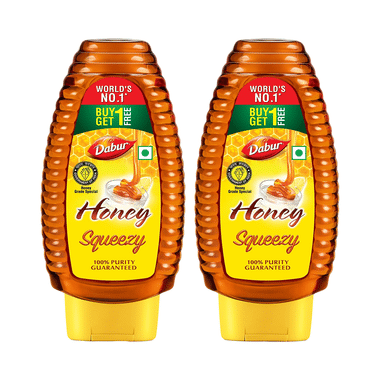Dabur Honey Squeezy | 100% Pure | No Sugar Adulteration | Buy 1 Get 1 Free
(700 gm Paste in bottle)
Rs. 594
Rs. 625
5% off
Rs. 594
Rs. 625
5% off
Not Available
Dabur Honey Squeezy | 100% Pure | No Sugar Adulteration | Buy 1 Get 1 Free
(700 gm Paste in bottle)
Available in other variants

Product Details
Dabur Honey Squeezy helps boost immunity, manage weight, and gives a healthy start to your day. It is also known to help improve digestion and metabolism. Dabur honey is entirely sourced from Indian beekeepers and conforms strictly with all the 22 parameters mandated by FSSAI (food safety and standards authority of India) for testing honey. For a healthy start to your day, you can have Dabur honey with warm water daily.It aids in improving stamina and digestion. It helps maintain cholesterol levels and supports a healthy lifestyle. It comprises antioxidants and aids in boosting immunity
Key Ingredients:
Honey
Key Benefits:
Diet Type:
Vegetarian
Per Serving Contains:
320 kcal/serving (100 gm)
Product Form:
Liquid Syrup
Directions for Use:
Safety Information:
Key Ingredients:
Honey
Key Benefits:
- It conforms with all the 22 parameters mandated by FSSAI for testing honey
- Dabur honey is also LCMS - MS tested for zero presence of antibiotics, as further mandated by FSSAI
- It is IRMS tested for zero added sugar and SMR tested for zero presence of rice syrup
- It is rich in antioxidants which help strengthen immunity
- It is a rich source of nutrition for you and your family
- Dabur honey, when mixed with ginger and other household ingredients, acts as a remedy for cough and cold
- It helps to boost energy and keeps you active throughout the day
- This packaging helps to prevent spills, making it mess-free and helps in portion control
Diet Type:
Vegetarian
Per Serving Contains:
320 kcal/serving (100 gm)
Product Form:
Liquid Syrup
Directions for Use:
- One tablespoon of dabur honey with warm water daily morning helps manage weight and supports heart health
- It can be consumed by adding to cornflakes, green tea, milk, toast and breakfast
Safety Information:
- Read the label carefully before use
- Store in a cool and dry place, away from sunlight
- Keep out of reach of children
- Don’t refrigerate












